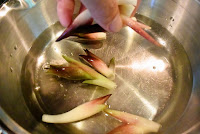Whole recipe (solids):
29 calories; 1.3 g protein; 0.1 g fat; 12.0 g carbohydrate; 5.6 g net carbs; 47 mg sodium; 0 mg cholesterol; 2.9 g fiber
1 medium-large myoga (1/5 of recipe):
6 calories; 0.3 g protein; 0 g fat; 2.4 g carbohydrate; 1.1 g net carbs; 9 mg sodium; 0 mg cholesterol; 0.6 g fiber
<Ingredients>
For amazu sweetened vinegar
4 tbsp rice vinegar
2 tbsp water
1 1/2 tbsp sugar (or substitute in equivalent amount; 1 1/2 tbsp erythritol and 4 drops liquid stevia in photo)
1/2 tsp shiokoji salted rice malt
1 small piece kombu kelp (0.3 g in photo; optional)
<Directions>
1.
In a container or small pot, put all amazu ingredients other than kombu, and bring to boil.
Remove from heat, put kombu, and let cool.
2.
Cut off bottom (if discolored or soiled) of myoga.
Bring enough water (500 cc or so here) to boil, and blanch myoga for 30+ seconds.
Drain, and let cool.
3.
When both amazu and myoga are cool (at least to room temperature), put myoga in amazu, and place in the fridge.
4.
Ready to eat from Day 2 when myoga turns vivid pink and amazu takes on a light pink hue.
<Notes>
- Keeps in the fridge for a week to 10 days.
- Kombu makes the amazu milder.
- Small, skinny myoga in above photos are young buds from young plants. Plump medium-size buds having some color (dark purple or brownish green) over 50% or more of their surface are usually considered the best stage to eat.
- One typical way to eat myoga no amazuzuke is shown in photo at right. Myoga refreshes your palate when eaten with grilled fish (in this case, ling cod marinated in soy sauce, mirin, sake and ichimi pepper, and cooked in parchment paper-lined frying pan).
- The above nutrition figures are based on using erythritol and stevia (zero calories or net carbs) and on the assumption that 40% of amazu is consumed with myoga.











No comments:
Post a Comment